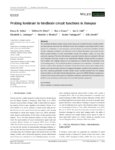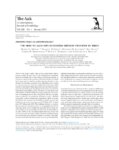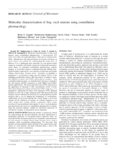|
|
Creator | Title | Description | Subject | Date |
| 1 |
 |
Davidson, Diane W. | Evolutionary ecology of symbiotic ant-plant relationships | Abstract.--A tabular survey of ant-plant symbioses worldwide summarizes aspects of the evolutionary ecology of these associations. Remarkable similarities between ant-plant symbioses in disjunct tropical regions result from convergent and parallel evolution of similarly preadapted ants and plants. ... | Symbioses; Evolution; Taxonomic | 1993 |
| 2 |
 |
Bohs, Lynn A. | Eggplant origins: out of Africa, into the Orient | The eggplant (Solanum melongena L.), also known as aubergine or brinjal, has been cultivated for centuries in the Old World and is currently a crop species of global importance. Despite this, hypotheses of eggplant evolution have been fraught with controversy. Previous conclusions have relied solely... | Eggplant origins; Crop domestication; Solanum melongena complex; Solanum incanum; DNA sequence; Africa; Asia | 2010 |
| 3 |
 |
Clayton, Dale H.; Rogers, Alan R. | Genetic analysis of lice supports direct contact between modern and archaic humans | Parasites can be used as unique markers to investigate host evolutionary history, independent of host data. Here we show that modern human head lice, Pediculus humanus, are composed of two ancient lineages, whose origin predates modern Homo sapiens by an order of magnitude (ca. 1.18 million years). | Pediculus humanus; Head lice; Molecular phylogeny; Phthirus | 2004 |
| 4 |
 |
Kelley, Darcy B.; Elliott, Taffeta M.; Evans, Ben J.; Evans, Ben J.; Hall, Ian C.; Rhodes, Heather J.; Yamaguchi, Ayako; Zornik, Erik | Probing forebrain to hindbrain circuit functions in Xenopus | The vertebrate hindbrain includes neural circuits that govern essential functions including breathing, blood pressure and heart rate. Hindbrain circuits also participate in generating rhythmic motor patterns for vocalization. In most tetrapods, sound production is powered by expiration and the circu... | fictive respiration; vocalization; pattern generation | 2016 |
| 5 |
 |
Sekercioglu, Cagan | Importance of Ethiopian shade coffee farms for forest bird conservation | Coffee is the most important tropical commodity and is grown in high-priority areas for biological conservation. There is abundant literature on the conservation value of coffee farms internationally, but there has been little research on this topic in Africa. Ethiopia is a diverse and little-studie... | | 2014-01-01 |
| 6 |
 |
Davidson, Diane W.; Rickart, Eric Allan; Keiter, Robert B. | Selecting wilderness areas to conserve Utah's biological diversity | Congress is currently evaluating the wilderness status of Bureau of Land Management (BLM) public lands in Utah. Wilderness areas play many important roles, and one critical role is the conservation of biological diversity. | Bureau of Land Management; Conservation; Endemic species; Exotic species; Cryptobiotic soils; Plants; Bees; Vertebrates | 1996 |
| 7 |
 |
Shapiro, Michael D. | Divergence, convergence, and the ancestry of feral populations in the domestic rock pigeon | Domestic pigeons are spectacularly diverse and exhibit variation in more traits than any other bird species [1]. In The Origin of Species, Charles Darwin repeatedly calls attention to the striking variation among domestic pigeon breeds - generated by thousands of years of artificial selection on a s... | | 2010 |
| 8 |
 |
Shapiro, Michael D. | Divergence, convergence, and the ancestry of feral populations in the domestic rock pigeon | | Stringham, Sydney A.; Mulroy, Elisabeth E.; Xing, Jinchuan; Record, David; Guernsey, Michael W.; Aldenhoven, Jaclyn T.; Osborne, Edward J. | |
| 9 |
 |
Bohs, Lynn A. | Three-gene phylogeny of the genus Solanum (Solanaceae) | Solanum, with approximately 1,500 species, is the largest genus in the Solanaceae and includes economically important species such as the tomato, potato, and eggplant. In part due to its large size and tropical center of diversity, resolving evolutionary relationships across Solanum as a whole has ... | ndhF; trnT-F; Waxy; Solanum; Cyphomandra | 2007 |
| 10 |
 |
Farmer, Colleen G. | Reproduction: the adaptive significance of endothermy | A central theme raised by Angilletta and Sears is that the energetic cost of endothermy is too enormous to be offset by the benefits that thermogenesis could provide for reproduction. Angilletta and Sears suggest that parents would have been better off producing additional offspring with the energy ... | Parental care; Incubation; Metabolism | 2003 |
| 11 |
 |
Yamaguchi, Ayako | Rhythm generation, coordination, and initiation in the vocal pathways of male African clawed frogs | | central pattern generator; vocalization; parabrachial area; hindbrain; bilateral coordination; motor programs | 2016 |
| 12 |
 |
Potts, Wayne K. | Evolution of mating preferences and major histocompatibility complex genes | House mice prefer mates genetically dissimilar at the major histocompatibility complex (MHC). The highly polymorphic MHC genes control immunological self/nonself recognition; therefore, this mating preference may function to provide "good genes" for an individual's offspring. However, the evidence ... | Inbreeding; Parasites; Recognition | 1999 |
| 13 |
 |
Sekercioglu, Cagan | Causes and consequences of bird extinctions | Increased human domination of the planet has caused the declines and extinctions of countless species. Each species has not only intrinsic value, but ecological functions of organisms are also essential for the integrity of ecosystems that allow people to benefit from essential free ecosystem servic... | | 2003-01-01 |
| 14 |
 |
Coley, Phyllis D. | What's up? Perspectives from the first international forest canopy conference at Sarasota, Florida, 1994 | Jumars, caribineers, pole pruners, tree bicycles, Bosun's chairs, booms, peconhas . . . these terms are not listed in most biological dictionaries. Nor are construction cranes or large treehouses or hot-air dirigibles listed as priority equipment for any scientific laboratories. But these are th... | | 1995 |
| 15 |
 |
Sekercioglu, Cagan | The need to quantify ecosystem services provided by birds | What are birds worth-what is their actual dollar value to human society? To most of us in the ornithological community, birds are invaluable. But in these times we need more specific rationales to convince policy makers and business leaders to include bird conservation in land-use and development de... | | 2011-01-01 |
| 16 |
 |
Ehleringer, James R.; Cerling, Thure E.; Dearing, Maria-Denise | Experimental study of carbon-isotope fractionation between diet, hair, and feces of mammalian herbivores | The carbon-isotope composition of hair and feces offers a glimpse into the diets of mammalian herbivores. It is particularly useful for determining the relative consumption of browse and graze in tropical environments, as these foods have strongly divergent carbon-isotope compositions. Fecal ?13C v... | Fractionation; Mammalian herbivores; Medicago sativa; Cynodon dactylon | 2003 |
| 17 |
 |
Inagaki, Ryota T.; Raghuraman, Shrlnlvasan; Chase, Kevin; Steele, Theresa; Zornik, Erilk; Olivera, Baldomero; Yamaguchi, Ayako | Molecular characterization of frog vocal neurons using pharmacological constellation. | | constellation pharmacology; motor programs; parabrachial nucleus; premotor neurons; vocalizations | 2020 |
| 18 |
 |
Hultine, Kevin; Sperry, John S. | Transpiration and hydraulic strategies in a piñon-juniper woodland | Anthropogenic climate change is likely to alter the patterns of moisture availability globally. The consequences of these changes on species distributions and ecosystem function are largely unknown, but possibly predictable based on key ecophysiological differences among currently coexisting species... | Drought; Hydraulic transport model; Juniperus osteosperma; Plant water use; Sap flux; Species distributions | 2008 |
| 19 |
 |
Hultine, Kevin | Ecohydrologic significance of hydraulic redistribution in a semiarid savanna | Recent studies have illuminated the process of hydraulic redistribution, defined as the translocation of soil moisture via plant root systems, but the long-term ecohydrologic significance of this process is poorly understood. Copyright [year] American Geophysical Union. Reproduced by permission... | Moisture; Roots; Water | 2008 |
| 20 |
 |
Sekercioglu, Cagan | The effects of climate change on tropical birds | Birds are among the most widely studied organisms on earth and represent an important indicator group for learning about the effects of climate change - particularly in regard to the effects of climate change on tropical ecosystems. In this review, we assess the potential impacts of climate change o... | | 2010-01-01 |
| 21 |
 |
Davidson, Diane W. | Dispersal adaptations of some acacia species in the Australian arid zone | Most Australian representatives of the genus Acacia have diaspores with arillate appendages indicative of adaptation for active dispersal by animals. Based on physical and chemical characteristics of these arils and mechanisms of diaspore presentation, a number of arid zone acacias can be distingu... | Acacia; Australian arid zone; Dispersal ecology; Fruit quality; Myrmecochory; Ornithochory; Seed parasitoids; Soil nutrients | 1984 |
| 22 |
 |
Coley, Phyllis D. | Herbivory and defensive characteristics of tree species in a lowland tropical forest | Rate of herbivory and defensive characteristics of young and mature leaves were measured for saplings of 46 canopy tree species in a lowland tropical rain forest (Barro Colorado Island, Panama). Grazing rates were determined in the field for sample periods in the early wet, late wet, and dry seasons... | Fiber; Herbivory; Life history; Panama; Phenolics; Plant growth; Spatial distribution; Tannins; Temporal distribution; Treefall gaps; Tropical forest | 1983 |
| 23 |
 |
Potts, Wayne K. | Major histocompatibility complex heterozygote superiority during coinfection | Genes of the major histocompatibility complex (MHC) play a critical role in immune recognition, and many alleles confer susceptibility to infectious and autoimmune diseases. How these deleterious alleles persist in populations is controversial. | Pathogen; MHC; Homozygotes | 2003 |
| 24 |
 |
Gerton, Jordan | Improved localization accuracy in stochastic super-resolution fluorescence microscopy by K-factor image deshadowing | Localization of a single fluorescent particle with sub-diffraction-limit accuracy is a key merit in localization microscopy. Existing methods such as photoactivated localization microscopy (PALM) and stochastic optical reconstruction microscopy (STORM) achieve localization accuracies of single emitt... | | 2014-01-01 |
| 25 |
 |
Bohs, Lynn A. | Ethnobotany of the genus Cyphomandra (Solanaceae) | Plants of the genus Cyphomandra (Solanaceae) have long been utilized for their edible fruits in their native Latin America. The best-known species is the domesticated tree tomato or tamarillo, Cyphomandra betacea. This species, popular as a raw or cooked fruit, is widely cultivated in Andean South ... | Cyphomandra; Cyphomandra betacea; Alkaloids | 1989 |

























